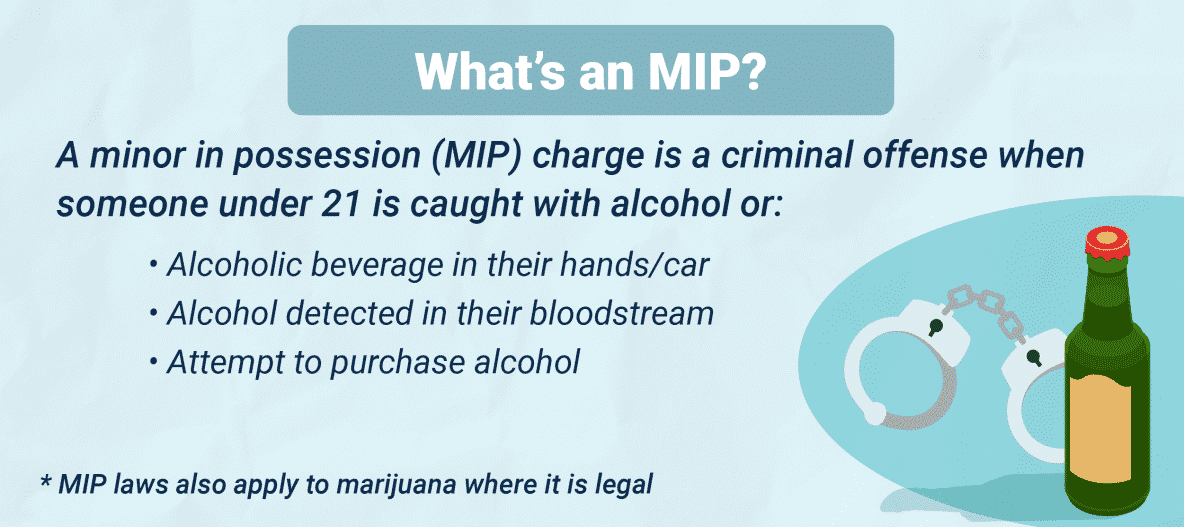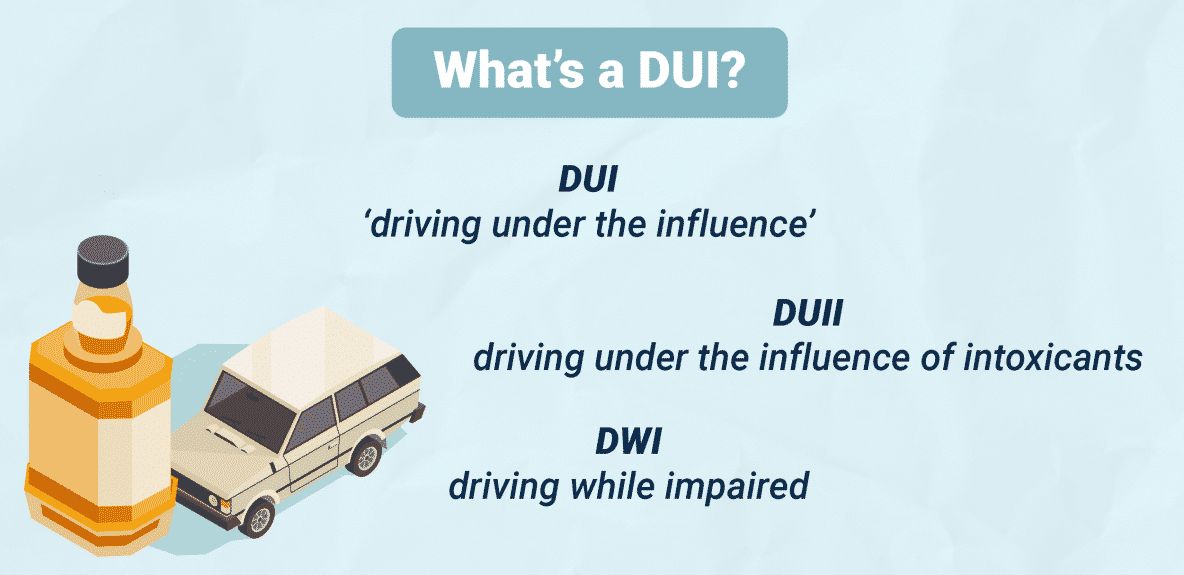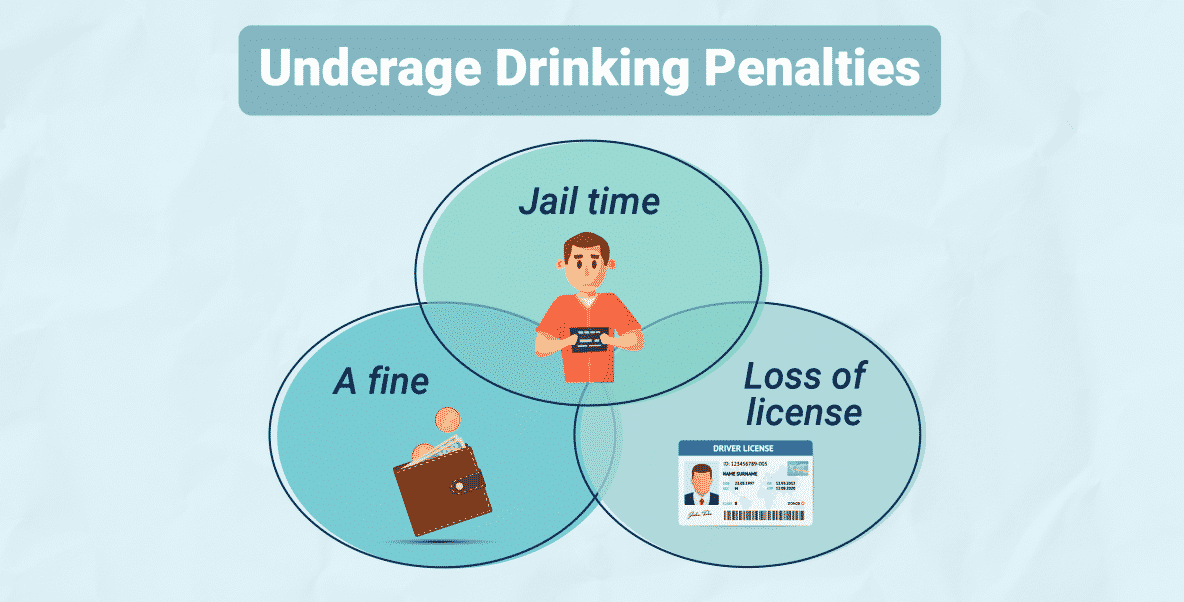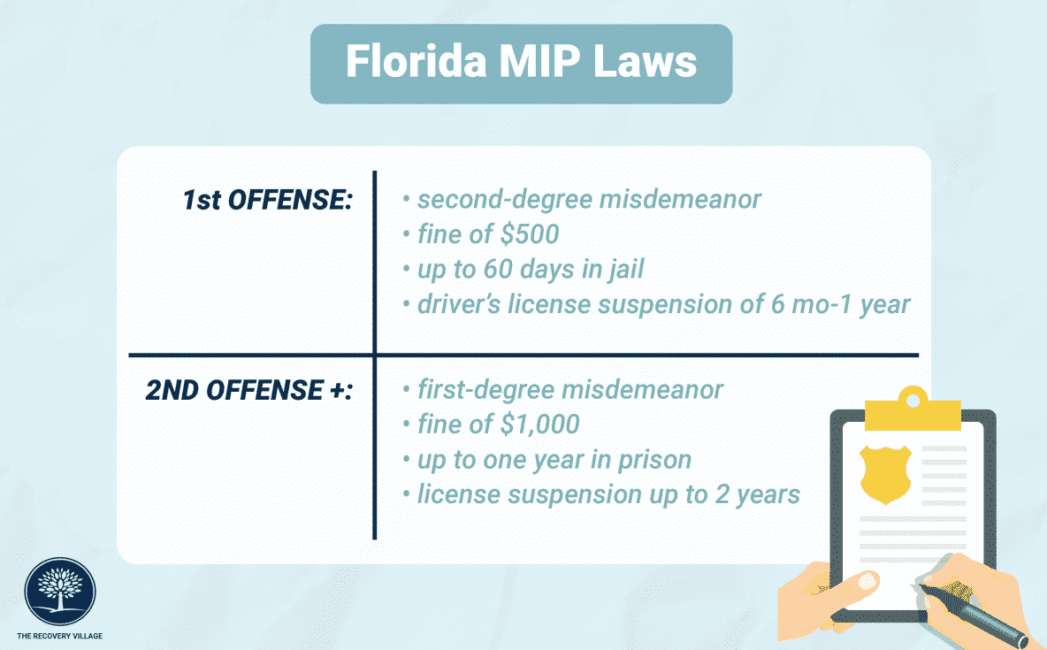Minor in Possession (MIP) charges come with serious consequences. Learn what the laws are and how to avoid having an MIP on your permanent record.
A minor in possession (MIP) charge is a criminal offense that results when someone under the age of 21 is caught with alcohol. Teens or young adults can receive an underage drinking charge if they:
- Have an alcoholic beverage in their possession (e.g., in their hands or in their car)
- Consume alcohol and have alcohol detected in their bloodstream
- Attempt to purchase alcohol
Some states allow exemptions in very specific circumstances, such as small amounts for religious purposes or under the supervision of a legal guardian. MIP laws also apply to marijuana in states where it is legal for persons 21 years old and over.

What is a DUI?
DUI stands for ‘driving under the influence.’ Sometimes, it is called a DUII – driving under the influence of intoxicants, or DWI – driving while impaired. These charges are usually alcohol-related, but they can also apply to driving while under the influence of another mind-altering substance, such as marijuana or an illicit drug.
The consequences of a DUI usually involve a fine, and a mark or restriction on the offender’s driver’s license. In the case of an underage DUI, the driver’s license may be revoked altogether.
Beyond the legal consequences, underage DUIs can come with some far-reaching penalties. A teen’s future job prospects can plummet with such charges, or they may face academic penalties. In the worst-case scenario, driving under the influence can be fatal to the driver, their passengers or people outside of the vehicle. The latest statistics show that drivers between the ages of 16 and 20 are 17 times more likely to die in a car crash when they have been drinking compared to when they have not.

Underage Drinking Penalties
The legal consequences for underage drinking or drug use vary from state to state. For example, an underage drinking ticket is a misdemeanor in most states, but it is a felony in some. Depending on if it is a first or a repeat offense, the penalty may be a fine, loss of driving privileges or even jail time. High schools and universities may have penalties of their own, such as expulsion or suspension from extracurricular activities.

Florida MIP Laws
Like other states, Florida requires that individuals must be at least 21 years old before they may possess or consume alcohol. Someone who is 18 years or older but under 21 can handle alcoholic beverages as a part of their job, so long as they work in a licensed establishment. Underage students may taste, but not consume, alcohol as part of a class at an accredited university.
A first-offense MIP charge in Florida is considered a second-degree misdemeanor. It comes with a fine of $500, up to 60 days in jail and a driver’s license suspension of six months to one year. A second offense or beyond is a first-degree misdemeanor and comes with a fine of $1,000, up to one year in prison and license suspension up to two years.
Florida underage drinking laws allow a few ways to avoid having a criminal record after an MIP charge. One is a juvenile or youth diversion program. A juvenile (under the age of 18 years) convicted of a misdemeanor will be referred to specific services or interventions, depending on the charge, instead of being sent to jail. For example, a 16 year-old person who is caught with alcohol may be sent to therapy for a substance use disorder. Another option is the Misdemeanor Diversion Program (MDP). In this program, first-time offenders who immediately take responsibility for their actions and seek rehabilitation can avoid going through the criminal court system.

Fighting a Charge
States usually have specific procedures in place to restore driving privileges or to have an MIP removed from your record. States may require individuals to take a class, pay off a fine, or write a letter to the court. For DUI charges, you may need to attend traffic court. Getting an MIP charge removed is usually much easier for a first offense than for a repeat offense.
Does Your Teenager Need Substance Abuse Help?
Have your teenager’s grades suddenly dropped, or do they often need money for unexplained reasons? Are they spending time with a different group of friends than usual, or are more tired than normal? Perhaps they are gaining or losing weight unexpectedly, or show other signs of poor health.
If you notice any signs of drug or alcohol addiction in your teen, now is the time to reach out to a professional. It is critical that they receive specialized help before they get into legal trouble or worse. Your family doctor or your teen’s pediatrician can help you determine the best course of action and provide you with helpful resources on substance abuse treatment options. They may need to enter a rehab program for teen alcohol or drug abuse.
At The Recovery Village, we can help you sort through those details — confidentially. You are not alone. Call to speak with one of our representatives today.


Washington State Office of the Attorney General. “MIP Laws.” Accessed June 22, 2019.
Oregon Liquor Control Commission. “Oregon’s Alcohol Laws and Minors.” February 2014. Accessed June 22, 2019.
National Institute on Alcohol Abuse and Alcoholism. “Possession/Consumption/Internal Consumption of Alcohol.” Alcohol Policy Information System. Accessed June 22, 2019.
Tillamook County Justice Court. “Minor in Possession of Alcohol.” Accessed June 22, 2019.
Centers for Disease Control and Prevention. “Teen Drinking and Driving: A Dangerous Mix.” CDC Vital Signs, October 2012. Accessed June 22, 2019.
Florida State Legislature. “The 2018 Florida Statutes: Title XXXIV, Chapter 562.” Online Sunshine. Accessed June 22, 2019.
Nolo. “Florida Minor in Possession of Alcohol Charges and Penalties.” Criminal Defense Lawyer. Accessed June 22, 2019.
Office of the State Attorney. “Diversion Programs.” 17th Judicial Circuit, Broward County FL. Accessed June 22, 2019.
The Recovery Village aims to improve the quality of life for people struggling with substance use or mental health disorder with fact-based content about the nature of behavioral health conditions, treatment options and their related outcomes. We publish material that is researched, cited, edited and reviewed by licensed medical professionals. The information we provide is not intended to be a substitute for professional medical advice, diagnosis or treatment. It should not be used in place of the advice of your physician or other qualified healthcare providers.